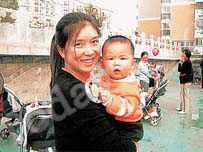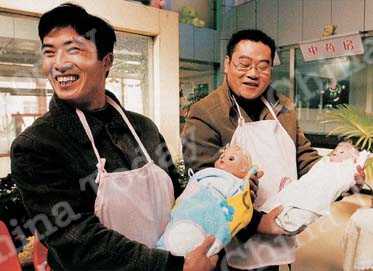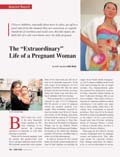Chinese children, especially those horn in cities, get off to a good start from the moment they are conceived, as regards standards of nutrition and social care. But this makes the daily life of a wife even busier once she falls pregnant.

Jin Yu and her baby.
BEST wishes for a son!" is the most frequently heard greeting at Chinese weddings. It expresses the common aspiration to procreate as soon after marriage as possible.
When Jin Yu became pregnant, both her parents and parents-in-law took turns to prepare nutritious meals for her. Her husband, meanwhile, took a greater share of the housework and did his utmost to be generally supportive. In the early stages of her pregnancy Jin Yu's appetite dwindled. But after the initial prenatal reaction she became ravenous, eating four meals a day and often waking at midnight with food cravings.
"During pregnancy a woman may be expected to gain 11.5-13.5 kilograms. But 80 percent or more of pregnant women are currently seriously overweight. Their resultantly 'outsized' fetuses necessitate more births by Caesarean section. In the Beijing area alone, Caesarean births make up 45-70 percent of the total," according to Xing Shucha, director of the School for Pregnant Women run by the Haidian District Health Center for Women and Children. Overeating in the belief that abundant nutrition will nurture a healthier baby is at the root of this phenomenon.
In order to increase Jin Yu's protein intake, her family started eating meat instead of their habitual rice porridge for supper. In her fourth month of pregnancy, Jun Yu began weighing herself each week and recording her rate of weight increase. Any disproportionate gains she countered by taking more exercise. In China, expectant mothers undergo at least 10 physical checkups. But as one doctor explains, "Since there is always a long line of expectant mothers awaiting consultation, I can usually only spare them a three-minute, rather than a 10-minute, basic consultation on general guidelines. They must fill in the details themselves from recommended reading on the subject." Jin Yu, a case in point, bought more than 20 books, including Menus for Pregnant Women, A Guide to Having a Healthy Baby, and How to Exploit the Wisdom of Babies.
These gaps are also filled by various recently established clubs for pregnant women and fathers-to-be. They offer yoga classes for expectant mothers, baby bathing instructions for fathers-to-be, as well as information on various methods of delivery and the anesthetic procedures applicable. Such classes inevitably hike the cost of preparing for the new addition to the family but, as Jin Yu says, "It's best to know as much as possible beforehand." Hospital pre-natal clinics encourage both pregnant women and their husbands to attend courses on diet, weight control, and preparations for the actual birth. The positive response to such advice is evident in the standing-room-only situation at courses on mid and late pregnancy at the Haidian District Health Center for Women and Children. Attendees include elders as well as young couples. All listen intently, taking notes.

The first Mothers-to-be Body Painting Contest held in Hainan Province pulled in 78 participants from all over China.
In order to increase Jin Yu's protein intake, her family started eating meat instead of their habitual rice porridge for supper.
Ladies-in-Waiting
When Jin Yu became pregnant, both her parents and parents-in-law expected her to resign from her job, stay home and prepare for the birth of her baby. But after listening to the opinions of various antenatal specialists, Jin Yu decided to carry on working. She was advised to continue participation in various activities organized by her workplace, and generally to maintain outside interests. Jin took this advice, and also decorated her baby's bedroom.
Throughout her pregnancy, Jin Yu was conscious of the influence of her mood on her unborn child. Her doctor had told her, "The affect of the mother's mood on the fetus is as significant as that of her diet, both of which directly influence the baby's temperament. Children with a balanced temperament are generally rational and have good cognitive skills, rather than being fractious and demanding."

Fathers-to-be at a maternity hospital training course. Photos by China Foto Press
Throughout her pregnancy, Jin Yu was conscious of the influence of her mood on her unborn child.
Jin Yu was understandably apprehensive at the prospect of giving birth. Her mother was even more anxious, as when she first married, childbirth generally took place at home with the help of an experienced midwife. Poor hygiene and a lack of medical expertise, however, made parturition a crucial time, fraught with risks such as a breech delivery or hemorrhages. Jin Yu calmed her mother's fears, telling her, "Nowadays hospitals not only give pregnant women careful examinations, but also prepare them for the actual birth by showing them how to breathe, bear down, and adopt the position most suitable for delivery during labor. I feel as prepared as I possibly could be, and my husband will be with me in the delivery room, to give me an added sense of security."
Jin Yu's husband attends classes for fathers-to-be at the Haidian District Health Center for Women and Children. He confirms, "Although my wife will be the one actually giving birth, there will be plenty for me to do. I can help relieve the pain by massaging her, and soothe her distress simply by talking to her. Being by her side at that time will show me just how traumatic the process of giving birth can be. It will also strengthen the emotional bond between us and create an even more harmonious environment in which to bring up our baby."
Perinatal Care
Perinatal care consists of systematic medical consultations. It encompasses early pregnancy examinations, periodical prenatal examinations, parturition care and service, supervision of high-risk mothers, and postpartum visits.
1. Expectant mothers should register at their community hospital or medical service center within the first 12 weeks of their pregnancy, bringing with them their residence booklet (hukou) and Birth Service Certificate (issued by the subdistrict office of the relevant hukou). The community hospital or medical service center establishes their Mother and Newborn Healthcare File. It is at this stage that expectant mothers are told what to expect during early pregnancy.
2. Mothers-to-be have at least 10 prenatal examinations over their entire term of pregnancy: one within the first 12 weeks; one every four weeks between the 12th and 28th weeks; one every two weeks between the 28th and 36th weeks; and weekly examinations after the 36th week. Women at high risk during pregnancy undergo more examinations.
3. Expectant mothers should attend the three courses applicable to early, middle and late pregnancy.
4. Mothers-to-be produce their Healthcare Files upon being hospitalized, in order for the obstetrician to write a report on the delivery for later reference.
5. A new mother should hand her Healthcare File back to the community hospital or medical service center within 48 hours of being discharged from hospital. Within the next three to seven days, a community doctor visits her at home. He or she will give guidance on such matters as breastfeeding and infant care, and also advise on and treat any mother or child ailments.
6. The community hospital or medical service center also provides mothers and babies with systematic healthcare, including inoculations.

Escorted mothers-to-be await their periodical checkup at the Haidian District Health Center for Women and Children.


 Copy Reference
Copy Reference 